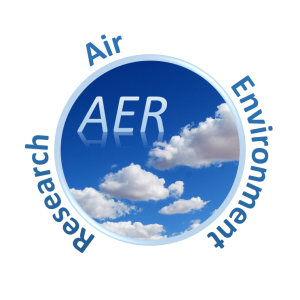Who are we and what do we do?
The University of Brighton Air Environment Research (AER) team is an integral part of the Environmental and Public Health research group within the School of Environment and Technology. Led by Dr Kevin Wyche and Dr Kirsty Smallbone, the AER team’s research focuses on four interlinking themes at the cutting edge of atmospheric and air quality science; these are,
1. Fundamental chemical processes controlling tropospheric composition and change
3. Analytical instrument development and implementation
4. Stakeholder engagement and communicating air quality information
The atmosphere is a vastly complex, dynamic system, responsible for sustaining life on Earth as we know it. The atmosphere can be roughly divided into four region, i.e. the troposphere, starosphere, mesosphere and thermosphere; our research focuses on the troposphere, the densest part of the atmosphere and the region that interacts with the Earth’s surface. Although it is comprised primarily of nitrogen and oxygen, the Earth’s atmosphere also contains a huge array of often transient, reactive species; it is these reactive species – present in tiny quantities – that control the chemistry of our atmosphere.
It is within the troposphere that life resides and into which all natural and the majority of man-made reactive trace gases are emitted; consequently, the troposphere plays host to a multitude of chemical processes. Left unperturbed, these processes will often lie at equilibrium, however, owing to the release of man-made pollutants to the troposphere, predominately since the industrial revolution, many of the atmosphere’s natural reactive cycles have seen a shift towards the production of harmful pollutants and negative environmental effects.
Over the last few decades we have witnessed a rise in the occurrence of many different types of air pollution issues, including the wintertime “black smoke” fogs of the middle of the last century, the production of acid rain in the 1980’s and photochemical smog formation during recent summertimes. Today, it is estimated that there are 430,000 premature deaths in the EU-28 owing to long-term exposure to fine particle pollution alone, and that exposure to the current levels of particulate matter pollution results in a one-year reduction in average life expectancy (WHO). Poor air quality also impacts society, well-being and the economy, with billions of Euros being lost across Europe each year as result of air pollution related illnesses; for example it has been estimated that lung conditions, exacerbated by air pollution, impose an annual burden of €50 billion on the EU economy. Also, impacting negatively on ecosystems, building materials and climate, air pollution is a key issue facing society today.
In order to better understand the roles and impacts of reactive species within the Earth’s atmosphere and hence to mitigate unwanted impacts on our air quality and climate, it is vital that we invest in, study and understand our atmosphere and its many complex processes.


